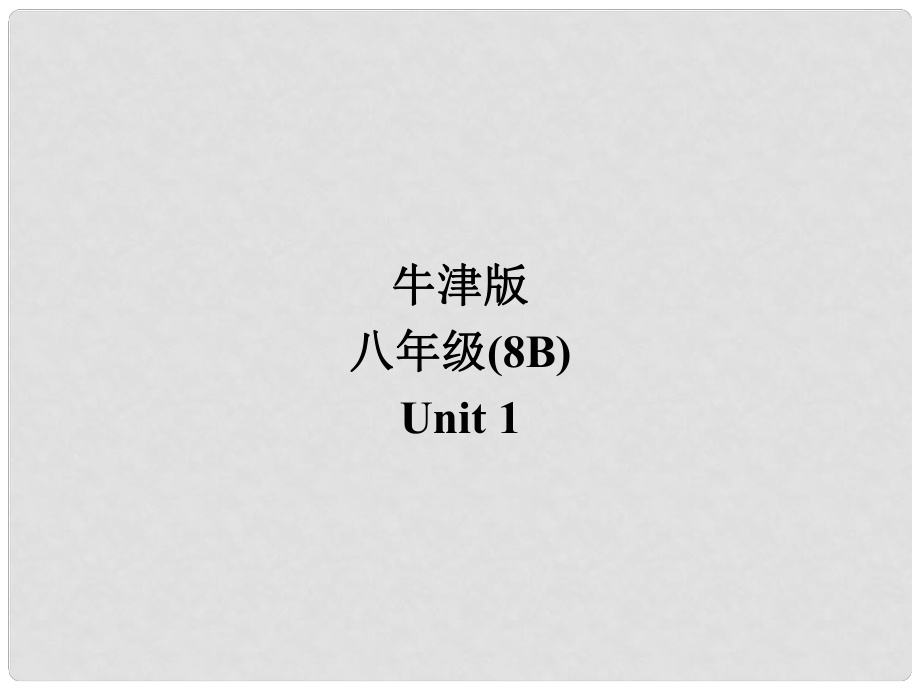《江蘇省宜興市屺亭中學(xué)八年級(jí)英語(yǔ)下冊(cè)《Unit 1 Past and preasent》Grammar II課件 牛津版》由會(huì)員分享�����,可在線閱讀,更多相關(guān)《江蘇省宜興市屺亭中學(xué)八年級(jí)英語(yǔ)下冊(cè)《Unit 1 Past and preasent》Grammar II課件 牛津版(23頁(yè)珍藏版)》請(qǐng)?jiān)谘b配圖網(wǎng)上搜索�����。
1�����、牛津版牛津版八年級(jí)八年級(jí)(8B)Unit 1Grammar現(xiàn)在完成時(shí)的時(shí)間副詞和時(shí)間短語(yǔ)現(xiàn)在完成時(shí)的時(shí)間副詞和時(shí)間短語(yǔ)1. 副詞副詞already和和yet�����。already一般用于肯一般用于肯定句中定句中, yet一般用于否定句和疑問(wèn)句中�。一般用于否定句和疑問(wèn)句中���。 如如: We have already finished our homework. 我們已完成作業(yè)了�。我們已完成作業(yè)了�����。They havent finished their homework yet. 他們還沒(méi)有完成作業(yè)�����。他們還沒(méi)有完成作業(yè)���。 - I have never been to the Great Wall. 我從未去
2、過(guò)長(zhǎng)城����。我從未去過(guò)長(zhǎng)城���。2. 副詞副詞ever 和和never。多用于否定或疑問(wèn)�����。多用于否定或疑問(wèn) 句中句中, 表示表示“曾經(jīng)曾經(jīng)”或或“從未從未”等��。等��。 如如: - Have you ever been to the Great Wall? 你曾經(jīng)去過(guò)長(zhǎng)城嗎你曾經(jīng)去過(guò)長(zhǎng)城嗎?He has been there twice the last few days. 近幾年他去過(guò)那里兩次了��。近幾年他去過(guò)那里兩次了。3. 用表示到說(shuō)話時(shí)為止的時(shí)間狀語(yǔ)用表示到說(shuō)話時(shí)為止的時(shí)間狀語(yǔ), 如如: just, before, up to now, the past few years等�。等��。如如: I hav
3、e seen her before, but I can not remember where. 我以前見(jiàn)過(guò)她我以前見(jiàn)過(guò)她, 但記不起在哪里見(jiàn)過(guò)�����。但記不起在哪里見(jiàn)過(guò)�����。如如: I havent seen him for two years.4. 表示動(dòng)作或狀態(tài)從某一時(shí)刻開(kāi)始表示動(dòng)作或狀態(tài)從某一時(shí)刻開(kāi)始, 一直一直 持續(xù)到現(xiàn)在的時(shí)間狀語(yǔ)持續(xù)到現(xiàn)在的時(shí)間狀語(yǔ): so far, for + 一一 段時(shí)間段時(shí)間, since + 過(guò)去時(shí)間或一般過(guò)去時(shí)過(guò)去時(shí)間或一般過(guò)去時(shí) 的句子��。的句子��。 Mrs Li has taught in our school since she left normal univ
4��、ersity. 李老師從師范大學(xué)畢業(yè)以后就在我們李老師從師范大學(xué)畢業(yè)以后就在我們 學(xué)校教書(shū)了����。學(xué)校教書(shū)了���。Complete the conversation using the present perfect tense of the verbs in brackets with the correct time expressions.Simon: Have you (1)_ (travel) by plane?Daniel: No, I (2)_ (travel) by plane _, but Ill fly to Sanyaever travelledhavent travelledy
5、et this summer. My parents and I will stay there for a whole week to enjoy the sun and the beach.Simon: Im sure youll enjoy the trip. By the way, did you know that my family (3)_ (own) a boat _ 1920?Daniel: I cant believe your family (4)_ _ (own) a boat _has ownedsince have ownedfor over 80 years!Si
6�����、mon: In fact, you (5)_ (see) it in the sitting room.Daniel: Oh, yes, but thats not real boat. Its only a model!Simon: I know, but it looks like a real one. Its just smaller.Daniel: I must say that its the best modelhave already seen I (6)_(see).Simon: Thank you, Daniel.have ever seen( )1. I have fin
7���、ished my homework _. Have you finished your homework _? A. yet, yet B. yet, already C. already, yet D. already, already( )2. I havent seen Kate _ 4 months. A. Already B. since C. for D. yet( )3. He has _ seen the film Harry Potter. So he knows nothing about it. A. already B. ever C. never D. yet ( )
8、 4. She has been ill in bed _ two days ago. A. since B. in C. during D. for( )5. Have you seen him _? No, I havent. A. already B. never C. ever D. recently( )6. I have _ watched a wonderful film. Its really interesting. A. yet B. just C. just now D. never( )7. Mike _ the bookshop. I have to wait for
9����、 him. A. went to B. was in C. has been to D. has gone to( )8. Oh, Mrs King, your dress looks very nice. Is it new? No, I _ it since two years ago. A. had B. bought C. have had D. have bought( )9. _ you _ a ticket for the football match? Not yet. A. Is, bought B. Are, bought C. Has, bought D. Have, b
10����、ought( )10. What a nice dog! How long have you had it? _ two years. A. For B. Since C. In D. Before( )11. Great changes _ in China since 1978. A. was happened B. have happened C. have been happened D. happened( )12. Tom _ a lot of friends since he came to China last year. A. made B. makes C. is maki
11��、ng D. has made( )13. “The World Without Thieves” is a very moving film. I _ it twice already. A. will see B. saw C. see D. have seen( )14. They _ since the factory opened. A. have worked there B. have worked here C. worked there D. worked here( )15. Lucy, _ you _ your ticket? Not yet. A. did, find B. have, found C. has, found D. do, find( )16. What are you going to do this Saturday? I _ yet. A. havent decided B. wont decide C. am not decided D. didnt decide Remember the use of present perfect tense.
 江蘇省宜興市屺亭中學(xué)八年級(jí)英語(yǔ)下冊(cè)《Unit 1 Past and preasent》Grammar II課件 牛津版
江蘇省宜興市屺亭中學(xué)八年級(jí)英語(yǔ)下冊(cè)《Unit 1 Past and preasent》Grammar II課件 牛津版

